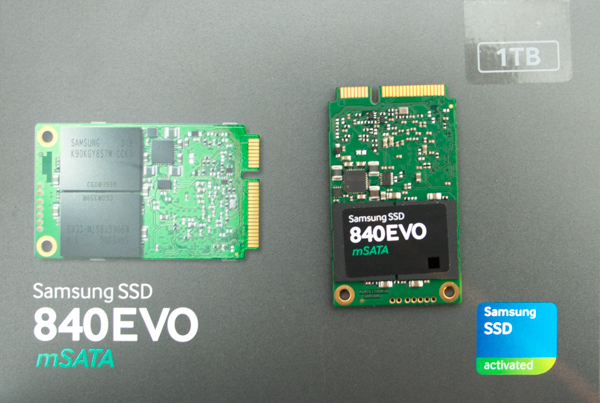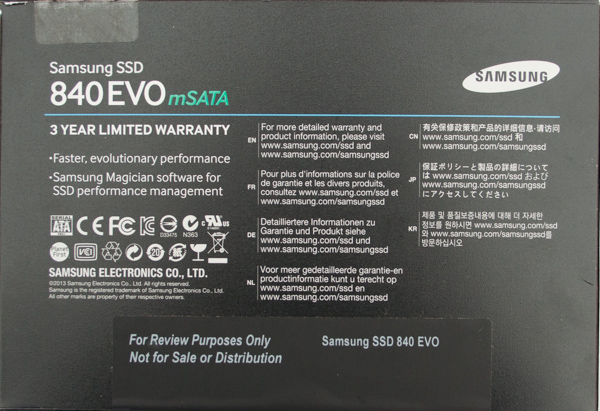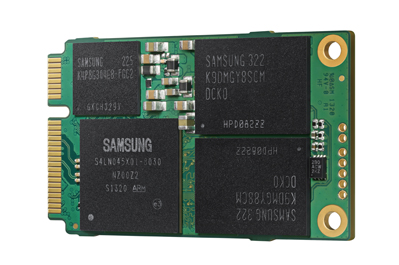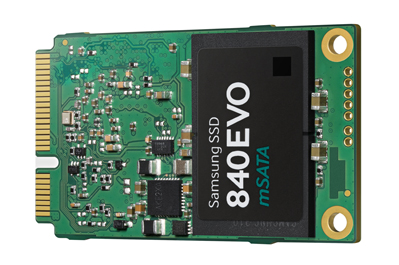Samsung 840 EVO mSATA Review: 120, 250, 500, And 1000 GB, Tested
Once upon a time, adopting mSATA-based storage meant compromising capacity and performance. With its 840 EVO, Samsung gives you access to as much as 1000 GB at incredibly fast speeds. The company even manages attractive pricing to keep mSATA competitive.
Meet Samsung's mSATA-Based 840 EVO
Up until now, we haven't seen storage giant Samsung devote much effort to the mSATA interface (at least, not in the aftermarket). That's changing though, and a quick trip to Newegg turns up retail packaging of the 840 EVO in capacities from 120 to 1000 GB. What's precipitating the new direction? An increasing breadth of devices employ the smaller format. There are laptops, sure. But more and more desktop motherboards come with mSATA slots as well. Then you have appliances like Drobo's Mini, which use mSATA-based solid-state storage for caching.
Apparently, Samsung determined that the time was right to make its move into mSATA (though enthusiasts fond of the company's desktop-oriented products might be muttering "it's about time"). We're promised that the wait was worth it. The 840 EVO platform boasts low power consumption and high density, both of which are important characteristics for mSATA-based drives that compromise little compared to the 2.5" form factor.
Another of Samsung's advantages is its control over every piece of the SSD puzzle. It manufactures the DRAM cache, the NAND flash, and the controller. Its engineers write the corresponding firmware and lay out the PCB all of those components drop onto. For as often as we talk about Samsung's vertical integration as a sign of its dominance in the space, the manifestation of this is control over supply. More than one SSD vendor has run into trouble sourcing parts for their drives, resulting in uncompetitive pricing at retail. Samsung doesn't have that problem.
With the 840 EVO's three-bit-per-cell NAND in 128 Gb densities, it's easier to achieve high capacities in small form factors. In fact, Samsung crams up to 1 TB onto the mSATA-based version of its 840 EVO, just like the 2.5" version. That's amazing, given the amount of PCB space available for a controller, cache, and NAND packages. The 840 EVO's 19 nm flash can be arranged in up to 16-die packages, meaning each of the four on-board emplacements host up to 256 GB. Amazing how that works out, right?
Samsung is shopping the mSATA-based 840 EVO family at four capacity levels: 120, 250, 500, and 1000 GB. There's a 750 GB version available in the 2.5" form factor you won't see make the transition, likely because the smaller market for mSATA storage doesn't justify its existence. Here's how the quartet of shipping 840 EVOs in mSATA trim break down, though:
| Samsung 840 EVO mSATA | 120 GB | 250 GB | 500 GB | 1000 GB |
|---|---|---|---|---|
| NAND | Samsung 19 nm Toggle-mode 2.0, 128 Gb Die, Three-Bit-Per-Cell Flash (TLC) | |||
| Controller | 400 MHz Samsung MEX, three-core ARM Cortex-R4 | |||
| Dies | 8 | 16 | 32 | 64 |
| Seqential Read / Write (MB/s) | 540/410 | 540 / 520 | ||
| Read / Write IOPS (QD=1) | 10,000 / 33,000 | |||
| Read / Write IOPS (QD=32) | 94,000 / 35,000 | 97,000 / 66,000 | 98,000 / 90,000 | 98,000 / 90,000 |
| Warranty | Three Years |
What this table doesn't reflect is the value-added Samsung Magician utility that comes bundled with the 840 EVOs. I've come to appreciate this inclusion as a fine piece of SSD management software. The latest version offers RAPID support to non-EVO drives like the 840 Pro. For those of you who missed our description of RAPID in Samsung 840 EVO SSD: Tested At 120, 250, 500, And 1000 GB:
RAPID is a software-based feature in Samsung's most recent build of Magician. Simply, it uses a gigabyte of system memory for caching hot data. Frequently-used applications are stored in RAM, ideally yielding much faster accesses when that data is needed over and over. Unlike other RAM-based caching solutions, RAPID keeps cached data persistent between reboots by writing information to the SSD itself.
Get Tom's Hardware's best news and in-depth reviews, straight to your inbox.
In my initial look at RAPID in the 840 EVO review, I showed that the feature does genuinely improve performance across a broad range of client applications.
Back to the mSATA-based drive. The 120 GB model pictured has two NAND packages, the MEX controller, and a DRAM cache on one side of the PCB.
The other side has surface-mount components and a sticker. Samsung's 250, 500, and 1000 GB drives would have two additional packages under the sticker. They're simply not needed for the 120 GB model, though.
Let's head over to the test bench to see what these little drives can do...
Current page: Meet Samsung's mSATA-Based 840 EVO
Next Page Test Setup And Benchmarks-
blackmagnum Maybe it's time to upgrade the HD of an old working notebook to SSD! But will a Core2Duo processor bottleneck a SSD?Reply -
jrharbort @blackmagnum: You don't have to worry about your processor being a bottleneck, but rather, your system's SATA interface. It is highly doubtful that your Core 2-based notebook (much like my own) has an m-sata slot, and the 2.5" bay for a HDD would have a SATAII port, not SATAIII. So the overall max read/write rates would be cut in half. But to answer your question in another way, tom's posted an article almost a year ago on the subject of upgrading older systems with an SSD: http://www.tomshardware.com/reviews/ssd-upgrade-sata-3gbps,3469.htmlReply -
spookyman @blackmagnum: You be glad to upgrade your hard drive to a SSD drive. Did it for my goddaughter's after she had a hard drive crash and it runs a lot faster then before.Reply -
JohnnyLucky Interesting article. It coincides with the current shift from desktop pc's to mobile pc's.Reply -
pyro226 "The latest version offers RAPID support to non-EVO drives like the 840 Pro."Got my hopes up there. The standard 840 series SSDs are NOT supported. The article didn't explicitly state they were, but what other drives (aside from the 840 Pro and EVO) have Rapid support? Perhaps "The latest version offers RAPID support to both EVO and 840 Pro SSDs." would be more accurate.Reply -
LordConrad "This company has a track record of disrupting the markets it enters; now that it's focusing attention on smaller form factors with enthusiast-class hardware, it's only a matter of time before we start seeing M.2-based offerings as well."This is mainstream hardware, I don't know any enthusiats who will settle for drives with TLC NAND.Reply -
lowguppy It is nice to see these finally available. I've been watching the Crucial m500 mSATA drive for a while, and the 480gb version frequently falls under $300 on NewEgg, which is competitive with 2.5" SSDs.Reply -
RedJaron Reply
"Enthusiast" to me doesn't automatically mean getting the fastest, biggest, bestest, craziest parts regardless of price. It also means people who put a lot more thought into their systems and thoroughly weigh all their options. MLC, TLC, or not, the fact remains that the EVO is a fast, reliable drive for a good price.12750948 said:This is mainstream hardware, I don't know any enthusiats who will settle for drives with TLC NAND.
Your argument sounds similar to, "I don't know any enthusiasts who will settle for LGA 1150 instead of LGA 2011," or "I don't know any enthusiasts that would settle for a non-K CPU."



